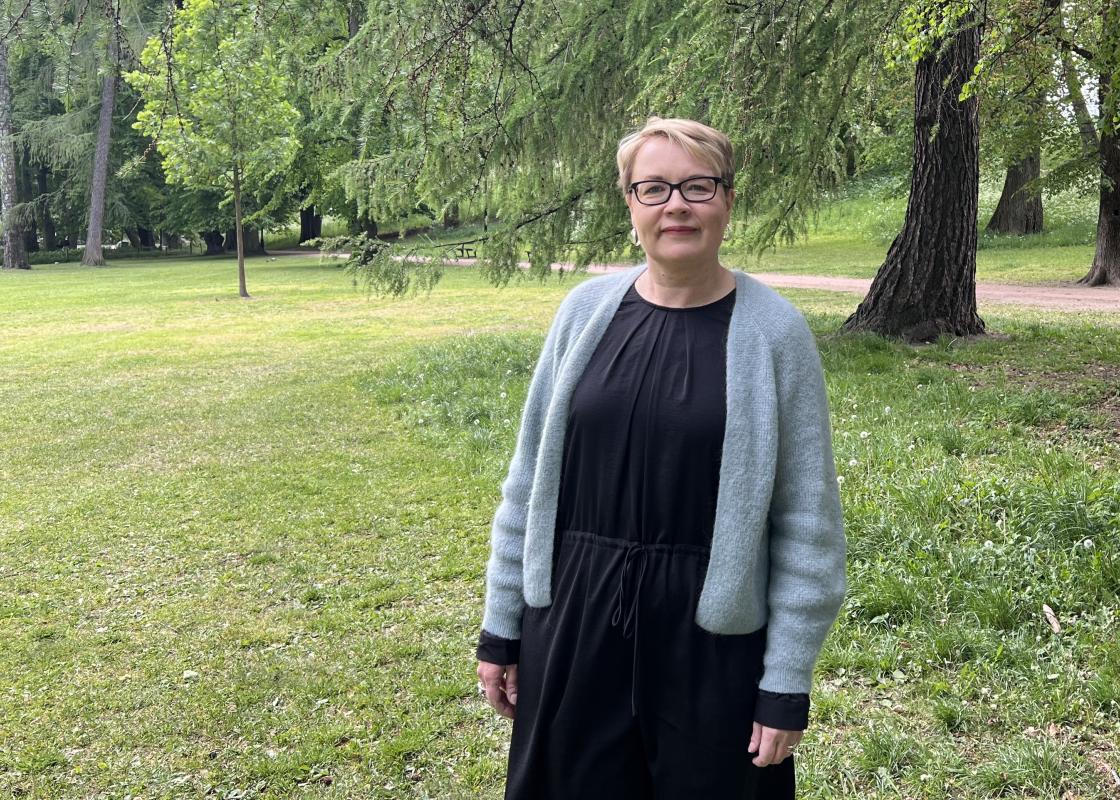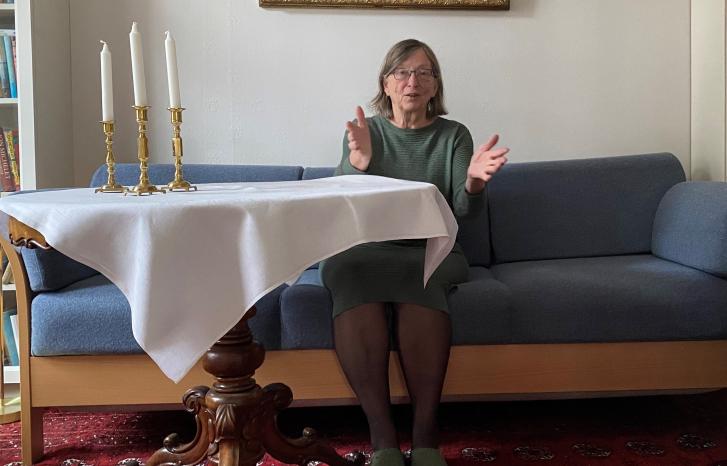You may have noticed that psychologists have regular columns in most major national media outlets, and that lifestyle and health are front-page news in many online newspapers. Social media is also awash with the same topics: make-up, wellness and self-improvement.
Welcome to "therapeutic culture".
At least, that's what Finnish researcher Suvi Salmenniemi calls it. Kilden news magazine met Suvi at the House of Literature in Oslo while she was visiting Norway.
The term has two meanings. On the one hand, it describes how psychological terms become embedded in our language. It also alludes to how the self and emotions play a key role in our understanding of the world.
"In many ways, self-help books symbolise this culture, but my research also covers spiritual movements, such as the angel healing movement and alternative health movements," she explains.
"They have quite a lot in common," says Salmenniemi. She refers to them as therapeutic practices.
She studied such groups during more than five years of ethnographic fieldwork that resulted in the book Affect, Alienation and Politics in Therapeutic Culture, published in 2022. She studied yoga communities, various healing sessions and self-help communities – all of which particularly attract women.
Suvi Salmenniemi is a Professor of Sociology at the University of Turku in Finland. She specialises in political sociology, therapeutic culture, feminist theory, ethnography and critical social theory. She is currently studying political imagination and everyday utopias, and the changing patterns of work in sustainability transformation. Source: University of Oslo (UiO)
Self-help in the world's happiest country
Most people probably associate self-help literature with the USA. Salmenniemi's interest was, however, sparked during fieldwork in Russia in the 2000s, where the use of self-help books was also becoming widespread. The political situation eventually made fieldwork in Russia impossible, so her focus turned towards her home country.
She found the context of Finland also intriguing. The country topped the list of "World's happiest countries" between 2018–2020. It still remains high on the list, yet many people struggle with mental health issues, and depression is one the main reasons for the country’s high levels of sick leave. Along with burnout, these issues particularly affect women.
"People seem incredibly stressed."
The welfare state was in a state of crisis following the economic downturn in the 1990s. She concludes that dismantling welfare programmes provides fertile ground for alternative health services.
"I noticed that many of the people I interviewed had experienced difficulties accessing public healthcare services. There were either long waiting times, or they were just prescribed antidepressants as opposed to the healthcare they felt they needed."
These women felt they had nowhere else to turn. They couldn't afford a psychologist, so instead turned to the self-help section at the library – or a course in angel healing – in the hope of finding some kind of healing.
"Such therapeutic practices patch up holes in the welfare system, especially for poorer members of our society."
Offering support
One of the central points of the book is that all forms of therapeutic culture provide people space to create meaning in a capitalist society full of contradictions. Salmenniemi explains that this was especially true among women.
The majority of those attending yoga classes or trying alternative healing are women. It's really quite striking how these courses are dominated by white women, Salmenniemi exclaims.
"Of course, suffering also affects racialised and non-white people, but they clearly don’t turn to these same environments."
It’s one of many issues that deserves further research, she adds.
"These women were really struggling with the contemporary ideal of womanhood, of being successful in all areas of life. They were expected to run marathons, build careers, take care of themselves and maintain their appearance, prepare organic food for themselves and their children, and be good partners. Women experience quite a strong degree of cultural pressure."
Although therapeutic culture offers no immediate cure, simply sharing the experience of feeling exhausted offers a great deal of alleviation.
Is burnout a form of alienation?
Exhaustion – or burnout – has been of particular interest to Salmenniemi. She sees a connection between burnout and the left-wing thinker Karl Marx's concept of alienation.
"Marx's concept of alienation was long considered very outdated, but I believe alienation manifests itself today as burnout."
The German theorist Hartmut Rosa also expressed this notion.
In Finland – as in Norway – women top the burnout statistics. It's a long-standing, gendered trend, she explains. Men, on the other hand, top the suicide statistics.
"Burnout is a structural problem."
Many of the people Salmenniemi studied found a strong sense of meaning in exchanging experiences with others who had been through similar experiences.
"In fact, many of these gatherings resemble the consciousness-raising groups of the 1970s, but those attending would probably not identify as feminists or be aware of that connection."
It was in the wake of these consciousness-raising groups that the slogan "the personal is political" emerged, but that's not necessarily the case in these new groups, Salmenniemi explains.
"People seem incredibly stressed," says Salmenniemi.
This stress exists across all social classes. Salmenniemi recalls a conversation with a British research colleague a few years ago. Her colleague was struggling to balance work and family life, and had resorted to self-help books with a certain degree of ambivalence. She herself felt she ought to be critical of doing so, but said "I can't just sit in silence waiting for the feminist revolution."
An apolitical culture?
So, will these women turning to angel healing also start a revolution?
"Burnout is a structural problem. Therapeutic culture may well ease the symptoms, but it won't cure them," Salmenniemi asserts. "To achieve that, we need to change how work life is structured in a capitalist culture."
Many have argued that therapeutic culture is rooted in strong individualism, that it reflects the depoliticisation of the public sphere, where we retreat into our own minds and bodies and are content to remain there. That also relates to politics, Salmenniemi explains.
"We’re encouraged to see ourselves as unique individuals responsible for maintaining our own health so that we don't become a burden on welfare systems and social services."
Salmenniemi argues, however, that assuming therapeutic culture results in apolitical attitudes reflects a rather oversimplified understanding of politics.
A telling example is the founding of Krystallpartiet (The Crystal Party) in 2014. Five women who met on an energy healing course joined forces to start their own political party. Topping their agenda was strong dissatisfaction with the public health system – and the underlying view of health that underpinned it. They wanted a more holistic approach to health, believing that the biomedical model of the human body was limited and overly reductive.
Although the party may not have made any great waves in elections, it has been going strong for over ten years. Most of the party founders - whom Salmenniemmi also interviewed – had no prior political experience. They nonetheless believed problems could be resolved through political and democratic means. The Crystal Party often aligned with environmental parties on the political left, especially in its early days. Salmenniemi does not believe, however, that all forms of alternative movements entering politics will necessarily follow the same pattern.
Conspiracy theories
"We shouldn't assume that these communities are fundamentally apolitical, liberal or conservative," the professor asserts.
That’s because, in addition to self-care, political will can also be seen in lifestyle politics.
"A number of male podcasters and MAGA supporters seem to link alternative dietary advice – such as eating a lot of meat – with their political identity."
"That’s true – and this can also be seen in men's groups in Finland, where there’s a kind of concern about repressed masculinity."
The women who started the Crystal Party also found they were attracting people who believed in a lot of conspiracy theories.
"Can you tell us about the views on gender in the communities you studied?"
"It’s actually quite interesting – there's a lot of talk about feminine and masculine energies."
She believes that, while they may not claim men are from Mars and women from Venus, these communities still tend to reinforce strong gender norms. For example, women are seen as softer and more passive – and that’s something they have in common with the MAGA movement, even though members of the yoga community may be critical to such political ideologies.



